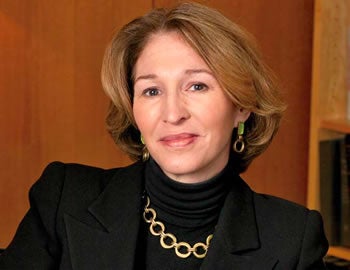Taking on work-life balance
This past summer, after the release of her article “Why Women Still Can’t Have It All,” Anne-Marie Slaughter ’85 was engulfed in what she calls a “tsunami” of her own making. In the article, published in the Atlantic, she described her painful realization that working at her dream job as director of policy planning at the State Department made it impossible to spend the time she needed with her two teenage sons. She argued that her experience was part of a larger societal problem—that for many mothers, almost any job with “long hours on someone else’s schedule” creates a tug of war between working and parenting. If women are going to consistently make it to the top levels of their chosen professions, Slaughter wrote, a lot has got to change.
The article almost instantaneously became a cultural touch point, discussed on television, radio, and the Internet, not to mention around boardroom and dining room tables. For Slaughter, who worked her way up to the top of what she calls the “very male world” of foreign policy by focusing on issues like governance, security, and international law and relations, suddenly becoming best known for her views on family life “was like watching a tidal wave wash away your professional identity.” Yet, as she’s known since she changed career paths after graduating from law school, “It’s fine to have a plan, but don’t expect that your life is going to follow it.”
From a young age—as the daughter of a Belgian mother and an American father, splitting her time between the U.S. and Belgium—Slaughter knew she wanted to go into the world of foreign policy. She expected to follow the typical path at the time, working at a corporate law firm and following a mentor there in and out of government and up the ladder. She accepted an offer from a New York firm but then backed out. “I realized that I couldn’t do that kind of work—I just wasn’t happy in a highly structured environment doing large deals that I didn’t feel connected to,” she says.
Instead, she returned to Cambridge and started working for the international law scholar Abram Chayes ’49 and other professors at HLS, including Laurence Tribe ’66. After a few years, Chayes suggested she think about teaching.
“I just never thought of myself as living the quieter life of a scholar,” she recalls. But she came to realize—while teaching international law at the University of Chicago, and then for eight years at HLS—that “being a law professor, you can be both a scholar and really stay very engaged in the world of public policy.”
From Harvard, Slaughter went on to become the first female dean of the Woodrow Wilson School of Public and International Affairs at Princeton, her undergraduate alma mater. While there she also helped to lead the Princeton Project, aimed at developing a bipartisan national security strategy for the country.
Now, after seven years heading the Wilson School and two at the State Department—where she led the first Quadrennial Diplomacy and Development Review, one of Secretary Clinton’s main initiatives, designed to increase the role of development work in foreign policy—Slaughter is back teaching at Princeton and writing on foreign policy, having altered her career trajectory so she can spend more time with her family. She knows it’s right for her, but still, she feels the upward pull of the ladder. “It’s not always easy to take the advice I give, which is that if you’re really going to, in my case, be the parent I want to be, and the professional I want to be, you’re going to have to move laterally,” she says. “There is nobody who goes to Harvard Law School who is not accustomed to thinking about a straight upward trajectory—that’s what we’re conditioned to do—and I am basically saying, ‘Stop! No! That’s not going to work.’”
Slaughter is now also at work on a book focused on solutions to the issues she raised in the Atlantic article, pointing to companies, industries or countries with policies that help women balance work and family life. For the industry of law, with its focus on billable hours and the partnership track, “these are acute issues,” says Slaughter. “I think law is going to be a real testing ground for how you keep really talented women in the leadership ranks.”
